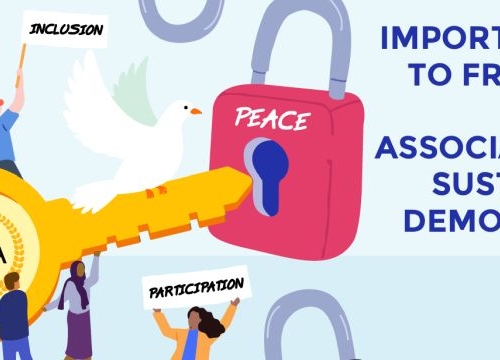CIVIC SPACE AND SUSTAINABLE PEACE: The critical role of the rights to freedom of peaceful assembly and of association in advancing sustainable peace and democratic transitions
Event
Side-event at the 78th Session of the United Nations General Assembly
This side event – co-organized by Clément Voule the United Nations (UN) Special Rapporteur on the rights to freedom of peaceful assembly and association and CIVICUS, and co-sponsored by us, ISHR and the permanent missions of Switzerland and Austria to the UN in New York– will discuss his new thematic report on the importance of the rights to freedom of peaceful assembly and of association in advancing sustainable peace and democratic transitions (A/78/246).
It aims to further the exchange of views among civil society, State representatives and UN bodies on strengthening the facilitation and protection of the rights to freedom of peaceful assembly and association for achieving inclusive and sustainable peace processes and democratic transitions.
The event will highlight specific barriers and challenges faced by those exercising their rights to freedom of peaceful assembly and association during times of insecurity and transition and will expand on recommendations outlined by the Special Rapporteur in his report aimed at enhancing the inclusion and participation of civil society and social movements, including marginalized groups, in these important processes.
Panelists
Panelists will include representatives of civil society organizations from Libya, Afghanistan, Columbia, Sudan and Yemen.
About the Report
In his report, the UN Special Rapporteur explores the importance of protecting, promoting and enabling the rights to freedom of peaceful assembly and of association during peace-making and transition process, as he underlines that the free and unhindered enjoyment of these rights is critical for facilitating broad and meaningful inclusion and participation. This is vital for building a resilient, inclusive and just society, contributing to, and ultimately achieving the advancement of sustainable peace and democratic transition. As such, the report argues that the promotion and protection of these rights should be central to all national, regional, and international conflict-prevention, peace-making, peace-building and democratic transition efforts.
The report further highlights the important contributions made by civil society and social movements, including women activists and peacebuilders around the world in bringing an end to conflicts and building sustainable peace and democratic transitions.
Coming at a time of global insecurity and threats to democratic order and transitions, the report seeks to contribute to the realisation of obligations grounded in international law and international commitments related to conflict prevention and inclusion, reaffirmed as key priorities by the UN Secretary General’s New Agenda for Peace. The Special Rapporteur reiterates that the principle of inclusion should be the norm in peacebuilding, conflict prevention and transition policies, which can only be guaranteed when the rights to freedom of peaceful assembly and association are effectively enabled and protected.
In order to advance and sustain peace and democratic order and to prevent the deepening of conflicts, the report calls on all stakeholders to stop seeing civil society, social movements and protests as an obstacle to peace and political transition negotiations. The Special Rapporteur called on all stakeholders to proactively engage with broad and diverse civil society actors, social movements, including women activists and peace-builders, and victims groups, as an integral and critical partner that should be included in all stages, including decision-making, of peace and democratic transition processes, from the design to the negotiations and implementation of peace and political agreements.
While the report primarily provides recommendations for States involved in or supporting peace and democratic transition processes, it highlights the responsibilities and obligations also of de facto authorities in their position as duty bearers to respect international human rights law, including protecting the rights to peaceful assembly and of association. The report equally highlights the critical role of the United Nations and the international community in ensuring meaningful and equal inclusion in peace and transition processes.








